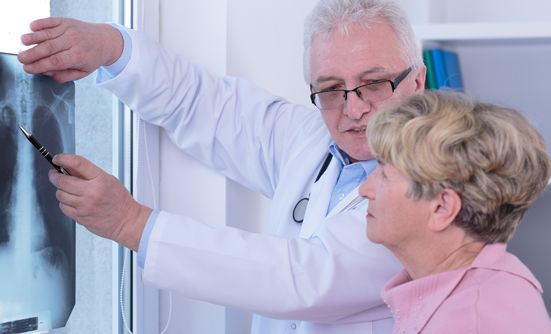Danielle Hicks, Senior Director of Patient Programs and Services for the Bonnie J. Addario Lung Cancer Foundation (ALCF), offers the following advice for anyone recently diagnosed with this disease.
1. Stay educated and up-to-date on your disease
“Lung cancer research is updating quickly, especially when it comes to precision oncology,” she says. “Things like biomarkers and targeted therapies are being turned out rapidly, so it’s important to stay in the know.”
The ALCF’s clinical research page is a great place to start investigating, especially when it comes to genetic/molecular testing that can reveal mutations in tumors that may respond to a targeted therapy. The ALCF also offers its patient education handbook as a free download on its website. This handbook is updated in real-time as new discoveries are made and is available in English, Spanish and Chinese.
2. Find emotional support
“Many people assume that lung cancer only affects smokers,” Hicks says. “Because of the stigma associated with lung cancer, many people feel shame or blame when it comes to their disease.”
Fortunately, there are a number of organizations that connect people recently diagnosed with lung cancer to people who are farther along in the process. In addition to the ALCF, Hicks recommends Immerman Angels as two good places to start.
3. Don’t wait to report side effects
“If you think there’s a problem with your therapy, don’t hesitate to bring it to your doctor’s attention,” Hicks says.
Side effects like nausea, vomiting and loss of appetite can contribute to weight loss and make cancer treatment even more difficult on the body.
“Sometimes the treatment can become worse than the disease,” she says. “Don’t wait until getting on top of them is harder than managing the disease itself.”
4. Evaluate your relationship with your doctor
“You need to be with a doctor who’s open to hearing your concerns and what you’re looking for, as opposed to telling you what to do because you’re the patient,” Hicks says. “Informed and shared decision-making is a huge part of treatment.”
If you’re not comfortable in your relationship with your doctor, you may want to consider finding a new one. A good starting place is often friends, family members, and people from a support group. Patients can also contact the ALCF for a list of lung cancer specialists in their area.
5. Reach out if you need financial assistance
“Sometimes Medicare and insurance isn’t prepared for all the new advances in lung cancer treatments,” Hicks says.
Patients should speak with their social worker or nurse navigator at their cancer treatment center to see if they can help with treatment advocacy. Beyond that, there are other resources and organizations available to people with lung cancer.
“Organizations like the ALCFF can help patients get the care they need at a more affordable cost,” she says. “Patients should enlist us as advocates to help them get the medication or treatments they need if they aren’t getting the support they need.”















